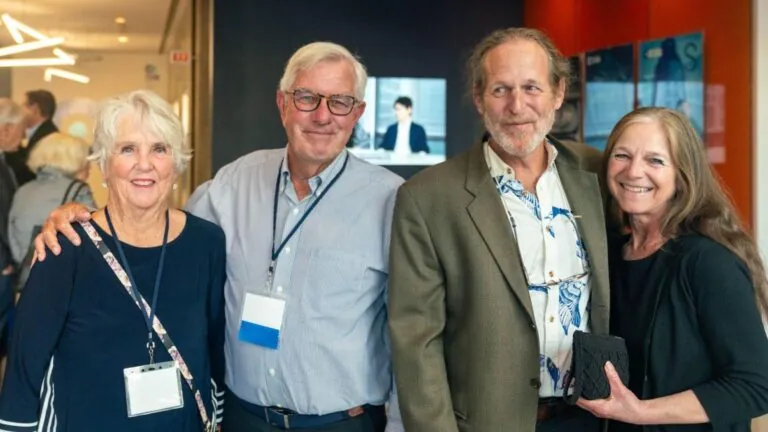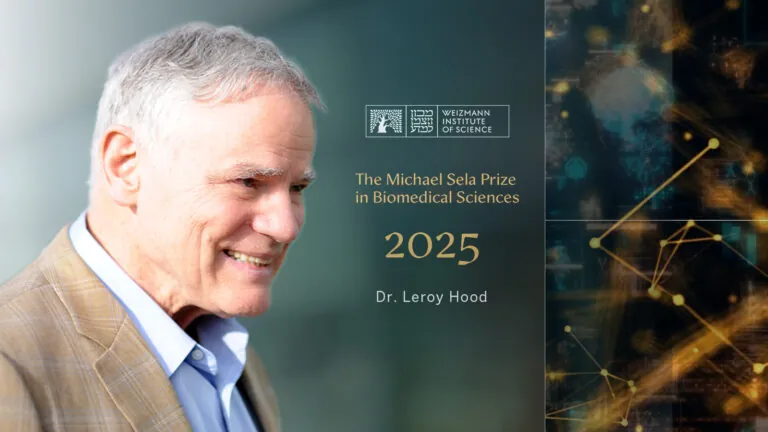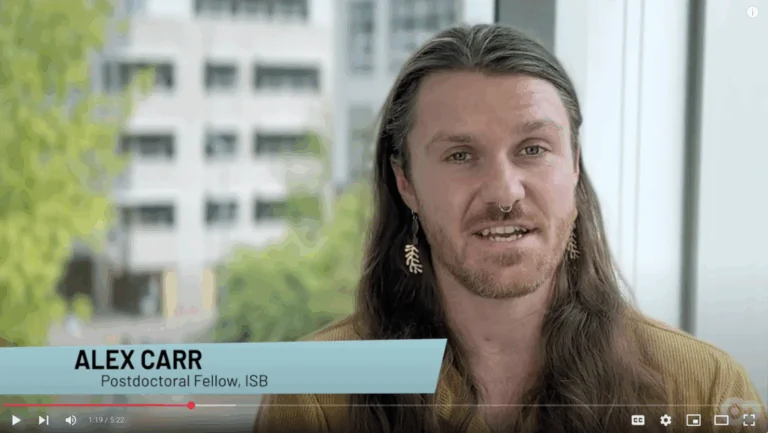2023 Year in Review
Throughout 2023, ISB research has been published in impactful peer-reviewed journals and our scientists have been featured in major media outlets and popular podcasts. In this 2023 Year in Review, we showcase some of our most important and interesting highlights of the year.

Throughout 2023, ISB research has been published in peer-reviewed journals like Cell and Nature, and our scientists have been featured in major media outlets (The Washington Post, Popular Mechanics, The Los Angeles Times, The Economist) and popular podcasts (Armchair Expert, Keeping it Real with Jillian Michaels).
It has been a busy year, and we continue to make our mark showcasing our groundbreaking science and world-class researchers.
Please enjoy this year-in-review roundup displaying some of our most important and interesting highlights of 2023. You can scroll through, or click the links below to land on the section that interests you most.
Research | Podcasts | Awards & Honors | Media Coverage | Events
Research
Building a better BMI
ISB researchers have constructed biological body mass index (BMI) measures that offer a more accurate representation of metabolic health and are more varied, informative and actionable than the traditional, long-used BMI equation. The work was published in the journal Nature Medicine. Read ISB’s news story here, and watch Drs. Noa Rappaport and Kengo Watanabe describe their research in the video below.
Attack? Remember? What determines a T cell’s function?
ISB researchers discovered that the genetically encoded T-cell receptor (TCR) sequence that humans develop in early childhood determines a T cell’s function. These novel findings have promising implications for better engineering custom immune responses to fight disease. The work was published in the journal Cell Reports. Read ISB’s news story here, and watch Daniel Chen and Dr. Jim Heath describe their research in the video below.
How immune cells ‘see’ and respond to mutations in cancer cells
In a paper published in the journal Nature, researchers from ISB, UCLA and PACT Pharma, analyzed T-cell responses in melanoma patients who were treated with different immune checkpoint inhibitors, and how those responses evolved over time. Below, watch our video with ISB President Dr. Jim Heath, Dr. Cristina Puig Saus and Dr. Antoni Ribas discussing the work and its future implications.
A chink in the armor of the world’s deadliest infectious disease
Mycobacterium tuberculosis (Mtb) is the pathogen that causes tuberculosis (TB), the world’s deadliest infectious disease. ISB researchers have identified a network within Mtb that allows it to tolerate and resist drug therapies. When the network is disrupted, researchers found that Mtb’s cells are unable to properly divide, compromising their cell wall – a key defense mechanism. Their findings were published in Cell Reports. Read ISB’s news story here, and watch our video with Drs. Eliza Peterson and Nitin Baliga discussing their work below.
Personalized coaching decreases cognitive decline in early-stage Alzheimer’s patients
Supplementing the standard of treatment for Alzheimer’s disease patients with personalized lifestyle coaching leads to less cognitive decline compared to standard of treatment alone, according to an ISB-led two-year study. The results were published in the Journal of Alzheimer’s Disease. Read ISB’s news story here.
COVID-19 vaccines and boosters are essential for maternal-fetal health
An ISB-led research team assessed a cohort of more than 100,000 pregnant women and found that COVID-19 vaccination was associated with lower rates of stillbirth, preterm birth and very low birthweight. These findings, published in Lancet Digital Health, are cited by Providence Swedish doctors to their pregnant patients. Read ISB’s news story here, and watch our video with Dr. Jennifer Hadlock and Providence Swedish Maternal-Fetal Medicine Physician Dr. Tanya Sorensen below.
Podcasts
Lee Hood and Nathan Price (on the future of medicine)
On the Armchair Expert podcast, Dax Shepard and Monica Padman interviewed Drs. Lee Hood and Nathan Price about their book, “The Age of Scientific Wellness,” and discussed how AI is changing the medical industry, how infectious disease has impacted our world, and more. Access the podcast here.
The future of medicine
Can chronic disease be prevented with data clouds, AI, genome testing and more? Can we add 50 years to our lives? Drs. Lee Hood and Nathan Price were guests on Jillian Michaels’ Keeping it Real podcast, and outlined what medicine will look like in the next five years – including the bright future of treatments for Alzheimer’s, cancer, and heart disease. Access the podcast here.
A gut feeling about precision medicine
On the Matters Microbial podcast, Dr. Sean Gibbons spoke with Mark O. Martin from the University of Puget Sound about how the study of host-associated microbial communities gives us insights into evolution, ecology and human health. Access the podcast here.
The next revolution in medicine
Drs. Lee Hood and Nathan Price were guests on the Doctor’s Farmacy podcast, and spoke with Dr. Mark Hyman about the future of personalized healthcare through scientific wellness, how AI is changing the medical industry, and much more. Access the podcast here.
How does the microbiome change with age?
Dr. Sean Gibbons was a guest on The Gutology Podcast and discussed his microbiome research, what worries him in the research field, what he’s excited about, and much more. Access the podcast here.
The future of medicine is personalized, predictive and in your hands
Drs. Lee Hood and Nathan Price were guests on The James Altucher Show, and discussed several topics: the role of AI in improving human lifespan, immunotherapy, NMN, gene editing, Alzheimer’s disease, and more. Access the podcast here.
Merging systems biology, big data and AI to usher in an age of scientific wellness
Dr. Lee Hood was interviewed by Ira Pastor for the Progress, Potential and Possibilities podcast. Access the podcast here.
Awards, Honors and Arrivals
Sid Venkatesh joins ISB as assistant professor
Dr. Sid Venkatsh is ISB’s newest faculty member. ISB President Dr. Jim Heath announced his arrival, saying: “Sid is an exceptional scientist whose research interests complement the work of many labs at ISB. I look forward to many future collaborations and exciting new research. Learn more about Venkatesh here, and stay tuned for a Q&A that will provide more details about his background, current and future plans, and more.
Jennifer Hadlock promoted to associate professor
Dr. Jennifer Hadlock – an expert in machine learning, immune-mediated inflammatory disease, and maternal/fetal health – was promoted to associate professor. “Jenn is a superb scientist. Since she joined ISB in 2018, she has published many important papers, collaborated with clinicians, established her lab, and worked on many federal- and industry-supported projects. We are fortunate to have her on our faculty,” said ISB President Dr. Jim Heath. Read ISB’s news story here.
ISB Ambassadors’ pandemic project wows DOE
High school students Ashwin Mukherjee and Rohan Chanani worked with ISB Research Scientist Dr. Jacob Valenzuela on a project to build a machine learning algorithm to count algal cells from microscope images taken from a cell phone. In April, the team was recognized as champions in the DOE-sponsored AlgaePrize competition. Read ISB’s news story here.
‘1 in 1,000’
ISB Associate Professor Dr. Sean Gibbons was named a Highly Cited Researcher for 2023. The Highly Cited Research list is generated annually by Clarivate, which says: “Of the world’s population of scientists and social scientists, Highly Cited Researchers are 1 in 1,000.” This is the second consecutive year Gibbons has earned this honor. Read ISB’s news story here.
AmeriCorps member Sarah Clemente joins ISB Education
Sarah Clemente joined ISB as a Systems Thinkers in STEM Ambassador Coordinator, and is the third AmeriCorps member to work with us. In a Q&A, Clemente shares what drew her to ISB, what she hopes to accomplish over the next year, and more. Read ISB’s news story here.
3 collaborative projects announced for ISB’s 2023 Innovator Award Program
ISB’s Innovator Award Program is now in its seventh successful year, and we announced three new collaborative projects. This internal program is designed to support novel research ideas that cut across disciplines and research groups. Washington Research Foundation generously pledged $100,000 to fund the 2023 awards, and ISB received additional funding from two generous donors. Read ISB’s news story here.
ISB spinout SYGNOMICS receives $2 million grant
The Andy Hill Cancer Research Endowment (CARE) Fund awarded a $2 million Life Science Startup Catalyst grant to SYGNOMICS, a precision oncology company whose mission is to apply systems biology to help deliver personalized precision care to cancer patients. SYGNOMICS is a spinout of ISB. “This funding is vital to help us advance and deliver personalized precision oncology solutions. We are grateful to CARE for this award,” said Dr. Nitin Baliga, principal investigator of the CARE grant, professor and director of ISB, and co-founder and chief science officer of SYGNOMICS. Read more here.
Media Coverage
Is AI the cancer-fighting tool we’ve been waiting for?
As AI and new imaging tools give researchers vast amounts of data on tumors, they are winning some battles against cancer. ISB President Dr. Jim Heath was interviewed for this extensively reported feature story for Newsweek Magazine.
Is this microbiome startup selling a wellness fantasy?
Sean Gibbons was quoted in this Bloomberg Businessweek story examining Viome and the often questionable microbiome-wellness startup space.
T-cell discovery unlocks potential for crafting tailored immune responses
This story published by Inside Precision Medicine covers ISB research showing that the different disease-fighting functions of distinct T cells are determined by the genetically encoded T-cell receptor (TCR) sequence that are unique to those cells. The findings are promising for developing custom immune responses to specific antigens.
Adding lifestyle coaching to treatment decreases cognitive decline in early Alzheimer’s
McKnights Senior Living published a news story detailing results from the ISB-led Coaching for Cognition in Alzheimer’s (COCOA) trial showing that supplementing the standard of care for early-stage Alzheimer’s disease with lifestyle coaching leads to less cognitive decline.
Long COVID: An explainer and research roundup
The Journalist’s Resource featured work by ISB researchers showing four predictive factors of long COVID. The Journalist’s Resource was created by Harvard Kennedy School’s Shorenstein Center on Media, Politics and Public Policy as an open-access online publication for journalists.
What the young can give to the old
The Economist highlights work by several ISB researchers showing that gut microbiome patterns reflect healthy aging and predict survival in humans. The work was originally published in the scientific journal Nature Metabolism.
A race against time: How science and technology are being used to delay aging
Dr. Lee Hood is featured in a CBC News story and video, and discusses using data to transform health, designing customized wellness plans based on individuals’ genetic risk profiles, and more.
People are just figuring out how BMI was originally calculated
IFL Science writes about how body mass index (BMI) is a long-used health indicator, but it comes with a long list of negatives, and details how ISB researchers developed biological BMI that generates a more useful, actionable and accurate molecular score.
Lee Hood wants to show you how to live for a really, really long time
Popular Mechanics interviewed ISB Co-founder and Professor Dr. Lee Hood for a story that features his big-data approach and focus on disease prevention – all in the quest to help us live longer.
Are all calories created equal? Your gut microbes don’t think so
The Washington Post cited ISB Associate Professor and microbiome specialist Dr. Sean Gibbons. Gibbons comments on a study he wasn’t involved with, saying it is interesting as it indicates people can lose body weight and body fat by switching to a diet that targets their gut microbiomes, even without exercising more or cutting back on calories.
New Alzheimer’s drugs are costly and controversial. Are we going about this all wrong?
There is tremendous market and media frenzy around new Alzheimer’s disease drugs, but their efficacy is contested while the potential of prevention is untapped and underreported, Drs. Lee Hood and Nathan Price wrote in an opinion piece published by the Los Angeles Times.
Can we cure dementia before it starts? He’s 84 and he’s trying
The Washington Post writes about the efforts of ISB Co-founder Dr. Lee Hood using systems biology and personalized medicine to predict and prevent dementia.
Scientists shed light on how immune cells respond to cancer cells
SciTechDaily reported on the research by ISB President Jim Heath and his collaborators at UCLA, PACT Pharma and beyond that identified and analyzed the process by which immune cells “see” and react to cancer cells. Their work provides valuable insights into why certain treatments may work for some patients but not for others.
Events
TOWN HALL SEATTLE
ISB has had a long and successful partnership with Town Hall Seattle. In 2023, we co-produced two events with Town Hall.
Exploring the age of scientific wellness for optimal health and disease prevention
In June, ISB President Dr. Jim Heath hosted a conversation with Drs. Lee Hood and Nathan Price about their book, “The Age of Scientific Wellness,” and the two authors detailed their vision of healthcare should look like, and what they think it is becoming. Read ISB’s news story here, and watch our video of the presentation below.
Exploring the intersection of art and science
In January, Jim Heath hosted a conversation with renowned artist Ginny Ruffner focusing on the intersection of art and science. Read ISB’s news story here, and watch our video of the presentation below.
RESEARCH ROUNDTABLE
We host the Research Roundtable virtual series to keep you up-to-date on the research happening at ISB. We hosted four interesting and varied roundtables in 2023.
Researchers find a chink in the armor of TB pathogen
Drs. Eliza Peterson and Nitin Baliga discussed their discovery of a pathway within Mycobacterium tuberculosis, the pathogen responsible for tuberculosis, that they hope can be edited with CRISPR to alter its ability to divide. Peterson and Baliga talked about the implications of this work and future research avenues to pursue. Watch our video of the presentation below.
Feeling the (Algaeo)rithm
ISB Senior Research Scientist Dr. Jacob Valenzuela hosted a Research Roundtable conversation with Rohan Chanani and Ashwin Mukherjee. As high school students, Chanani and Mukherjee worked on a project under the guidance and mentorship of Valenzuela. The project – Algaeorithm – was to build a machine learning algorithm to count algal cells from microscope images taken from a cell phone. In April 2023, the team was recognized as champions in a Department of Energy-sponsored AlgaePrize competition. Watch our video of the presentation below.
Beyond the scale
ISB researchers have constructed a biological BMI that provides a more accurate representation of metabolic health and is more varied, informative and actionable than the long-used classical BMI. ISB Senior Research Scientist Dr. Noa Rappaport discussed biological BMI in a Research Roundtable presentation. Watch our video of the presentation below.
How bacteria build communities that can impact your health
Bacteria are much more than single-celled organisms swimming around. Bacteria also form communities called biofilm, and work together to maintain the microbial community. In this Research Roundtable presentation, ISB Assistant Professor Dr. Anna Kuchina details her work studying biofilms. Watch our video of the presentation below.


